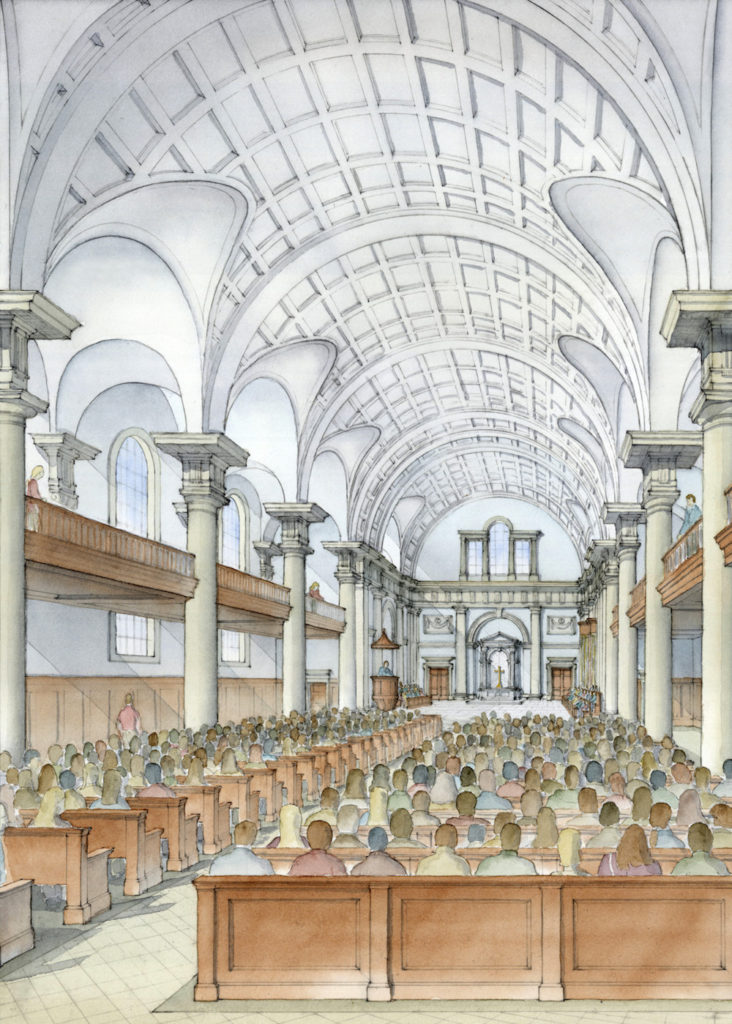
The new chapel is undoubtedly expensive. $28.5 million is a lot of money and, frankly, much of the advertisement for the chapel seems centered on the decadent grandeur of the project. Why, for example, do we need two organs?
As a weekly show host at the radio station (which is currently operating out of a converted maintenance closet) I understand the frustration of seeing money spent on a new chapel when there are things that seem far more pressing.
Nonetheless, Hillsdale College wasn’t founded to please me or any of the students, professors, or donors that interact with the school. According to our Articles of Association, Hillsdale College was founded “to furnish to all persons who wish… a literary, scientific or theological education… and to combine with this…moral, social and artistic instruction and culture.” If Hillsdale College thinks the best way to do that is to build a chapel, it should build a chapel. If building a chapel were in utter contradiction with my principles, I could leave and pursue education elsewhere; a professor could quit; a donor could give somewhere else.
Some students are upset because the administration seems to be restructuring Hillsdale in a way they do not like. Unfortunately, paying tuition to Hillsdale does not give you a right to representation in its executive decisions. Tuition is not taxation. You’ve voluntarily paid for a service. If Walmart were to radically change its marketing scheme in a way you found distasteful, you might express that opinion on a comment card. It might be expressed so eloquently and persuasively that Sam Walton himself reads it. But Sam Walton would be under no obligation to listen to you just because you shopped at Walmart. Likewise, the college might listen to our complaints — it might even be sympathetic in some circumstances — but it remains under no obligation to act according to our desires simply because we’ve paid tuition.
Some say the chapel is the college’s way of currying favor with donors. Perhaps it is. Why should it not be? After all, “donor” means “people that give the college money,” and if those people that give the college money want a chapel, it seems expedient that the college should build a chapel. The Board of Trustees has authority to direct the college however it thinks best to achieve the college’s purpose. The Board, who decides the mission, and the donors, who support the mission, think we should build a chapel. The only reason this should not be is if building a chapel would be contrary to the college’s founding principles — which it is not.
Some say the chapel is an attempt to “Christianize” the school, an argument with two possible sources: some believe building a chapel isn’t the best way to advance the established Christian character of the school; in some cases, however, it stems from the mistaken belief that Hillsdale was not already Christian. Hillsdale was, from its inception, “permeated with Christian influence.” Edmund Fairfield, President of Hillsdale College from 1848 to 1869, intended Hillsdale to “stand for ages to come,’’ as he writes in “The College and the Republic,” “sacred… to sound science, pure morality, and true religion.” All Hillsdale students receive a copy of this speech in their American Heritage reader, so it’s not as if the college has been secretive about its religious foundations, nor has it just now decided to be Christian. Article 6 of Hillsdale’s Articles of Association states: “Religious culture in particular shall be conserved by the College… it shall be a conspicuous aim to teach by precept and example the essentials of the Christian faith and religion.” Since Hillsdale is a Christian college, it seems pointless to protest building a place to practice Christianity.
We needn’t, however, docilely accept any decision of the college just because we don’t have governance over it. It’s a waste of time and energy to argue that the college should not pursue its mission. It’d be better to point out ways to pursue that mission more effectively. The college believes this chapel is an important part of advancing its mission — let’s strive to make it so.
Ms. Suchyta is a sophomore George Washington Fellow studying economics and history.

